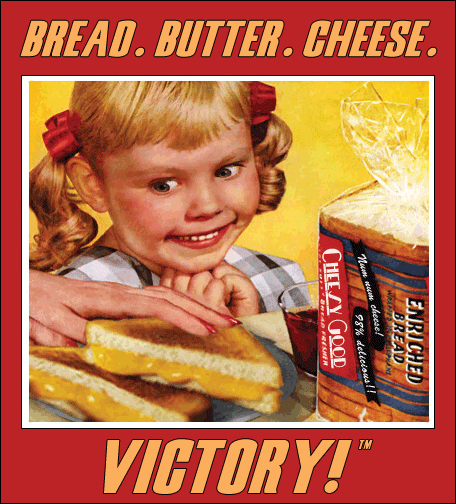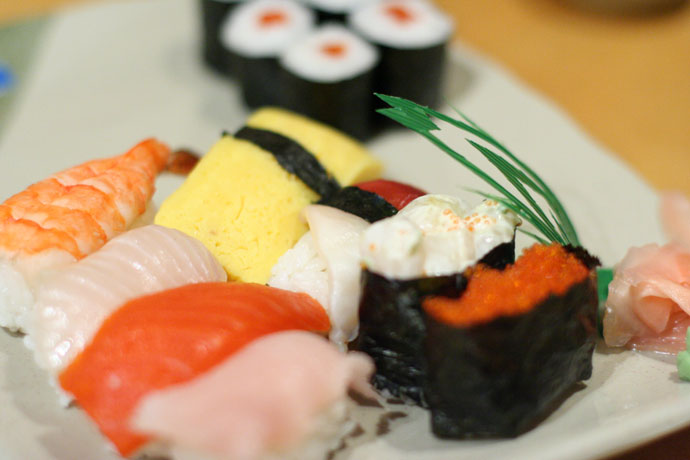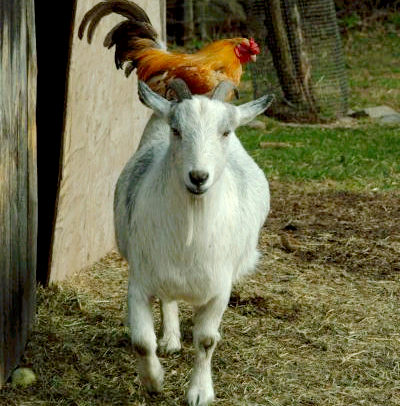In 2004, I spent a week at a cottage with a couple of my children in Eastern Ontario near Sandbanks Provincial Park on Lake Ontario. Lovely spot.
 One rainy day, we toured around and ended up at a cheese shop. They produced the cheese in the factory at the back, and had a charming market outlet that seemed to trap tourists like bees on sap.
One rainy day, we toured around and ended up at a cheese shop. They produced the cheese in the factory at the back, and had a charming market outlet that seemed to trap tourists like bees on sap.
Upon entering the store, a sign declared, “HACCP – A food safety program; Hazard Analysis Critical Control Pont.” Cool. I asked one of the staff what it meant. She said she didn’t know.
But beside the HACCP proclamation was a sign that read, “Public bathroom is out of order; for your convenience there is a blue Johnny on the spot behind the building (sic).”
 And here it is (left). Note the lack of handwashing facilities or sanitizer. I watched people go to the porta potty and then come into the cheese shop and do what people do at quaint cheese shops: stick their unwashed hands into shared samples of curds (that’s one of my daughters looking disgusted in the middle, right, not because of the practice, but because I have to take pictures and be a food safety geek everywhere we go).
And here it is (left). Note the lack of handwashing facilities or sanitizer. I watched people go to the porta potty and then come into the cheese shop and do what people do at quaint cheese shops: stick their unwashed hands into shared samples of curds (that’s one of my daughters looking disgusted in the middle, right, not because of the practice, but because I have to take pictures and be a food safety geek everywhere we go).
HACCP really doesn’t mean much unless there is a culture of food safety amongst the employees and everyone involved in making a product, like cheese or deli meat.
Best as I can figure, there is a separate outbreak of listeria in Quebec, in which one has died and 14 have been sickened. Eleven different types of cheese have been recalled, and many of them appear to be raw milk cheese, which the Quebec government recently approved for sale.
 While merchants are complaining about the crackdown and lost sales, what seems to have been lost in the coverage is that seven pregnant women – four confirmed, three suspected – have developed listeriosis and three gave birth prematurely.
While merchants are complaining about the crackdown and lost sales, what seems to have been lost in the coverage is that seven pregnant women – four confirmed, three suspected – have developed listeriosis and three gave birth prematurely.
Sylvie Thibault, a customer sampling some of the free cheeses at La Fromagerie Atwater yesterday, said she’s not worried, stating,
"I have started to double-check what cheese I buy. But I won’t stop eating the food I love because of a little scare."
Joe Schwarcz, director of McGill University’s Office for Science and Society, said,
"We need to put this in perspective," adding it’s important "not to have people think every time they bite into a piece of brie, they’re risking death."
Wow. I wouldn’t want to be pregnant in Quebec. So, Quebec government (Canada has no real authority in Quebec), given the number of pregnant women who have been sickened, any efforts to highlight the risks of listeria in certain foods to at-risk populations? Or is it just a silly little scare?
The recalled products from Fromagerie Medard are: Le Rang des Iles, Le 14 Arpents, Les Petits Vieux, Le Gedeon, Le Medard, Le Couventine, Le Cabrouet and Les Cailles, all with best-before dates between July 12 and Sept. 6. Products pulled off shelves from Fromagerie Table Ronde are: Le Fleurdelyse, Le Fou de Roi and Le Rassembleu with best-before dates after July 14.
Last week, cheeses manufactured by Fromages La Chaudiere were recalled because of salmonella, blamed for the death of an elderly person in the Chaudiere Appalaches region and 90 illnesses across Quebec.
 So I was horrified to read that hockey arenas in Gatineau, Quebec, will no longer be allowed to stock pop, chips, chocolate bars or poutine (actually, I don’t care about the poutine; it’s gross).
So I was horrified to read that hockey arenas in Gatineau, Quebec, will no longer be allowed to stock pop, chips, chocolate bars or poutine (actually, I don’t care about the poutine; it’s gross).

 Chinese food companies in particular have been blamed for making deadly alterations to dairy, baby and pet foods by adding melamine. The chemical makes it appear that the food or beverage has the required level of protein.
Chinese food companies in particular have been blamed for making deadly alterations to dairy, baby and pet foods by adding melamine. The chemical makes it appear that the food or beverage has the required level of protein. When asked about compensation for cheese retailers who had to discard potentially contaminated product,
When asked about compensation for cheese retailers who had to discard potentially contaminated product,  Producers and retailers reported a significant drop in sales of Quebec cheeses, which last year alone totaled $2.6-billion.
Producers and retailers reported a significant drop in sales of Quebec cheeses, which last year alone totaled $2.6-billion. She didn’t lose the baby. It’s not like she misplaced the baby somewhere. The baby died because of listeria.
She didn’t lose the baby. It’s not like she misplaced the baby somewhere. The baby died because of listeria. .jpeg) Mansel Griffiths, a dairy microbiologist at the University of Guelph
Mansel Griffiths, a dairy microbiologist at the University of Guelph We left Manhattan and our dogs on May 21, but picked up another for the 18 hour drive: a
We left Manhattan and our dogs on May 21, but picked up another for the 18 hour drive: a  This is the bathroom (right) in the Basilica, and like every other public washroom I’ve visited in Quebec, there was no paper towel.
This is the bathroom (right) in the Basilica, and like every other public washroom I’ve visited in Quebec, there was no paper towel. 